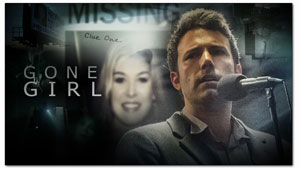
Hard to shake
Icy depths of ‘Gone Girl’ make for one of the year’s best
by Willie Krischke
My favorite movies are ones in which I forget that I’m watching a movie. By that I don’t mean that I forget that I’m in a theater, or that I forget the things happening on the screen aren’t really happening. That would be terrifying, and bizarre. I mean that I get so engrossed in the story itself – in what just happened, in what’s going to happen next – that I forget to pay attention to the individual elements of filmmaking, like the acting, the script, the pacing, the effects, etc. I get so caught up in the telling of a good story that I barely notice how it’s being told.
That’s what happened while I was watching “Gone Girl.” It is, without a doubt, an expertly directed, well-acted, perfectly shot and scored movie, but all those elements submit themselves to the telling of the story in such a perfect way that you’re unlikely to think about them while watching.
And my gosh, what a story. I think “Gone Girl” could easily have been turned into a TV show instead of a movie – it’s got plot to spare. The suspense and the twists could have gone on for several seasons. Unfortunately (for me at least,) it’s also full of twists and turns, all of them great, none of which I want to give away in this review, which means that, after the first 45 minutes of the film, I have to talk about it in extremely vague and un-writer-ly terms.
 Ben Affleck plays a Missouri boy who moved to New York to pursue a career as a magazine writer. He meets Rosamund Pike, a born and bred New Yorker, who is also a writer. Their romance is almost unbearably cute and clever. For a few minutes, I thought I had accidentally stumbled into a Nicholas Sparks movie. “We’re so cute I could punch us both in the face,” Pike says on one date, and I agree. But things don’t stay that way.
Ben Affleck plays a Missouri boy who moved to New York to pursue a career as a magazine writer. He meets Rosamund Pike, a born and bred New Yorker, who is also a writer. Their romance is almost unbearably cute and clever. For a few minutes, I thought I had accidentally stumbled into a Nicholas Sparks movie. “We’re so cute I could punch us both in the face,” Pike says on one date, and I agree. But things don’t stay that way.
The recession hits, they both get laid off, Affleck’s mom gets sick, and they move back to Missouri to take care of her. Pike is a fish out of water in the Midwest, they struggle financially, and their marriage crumbles. Affleck manages a bar he co-owns with his twin sister, and Pike stays home in their McMansion and reads crime novels. She has no friends, and he has no idea how she spends her days. One of them wants a baby, the other doesn’t. They hardly speak to each other.
Until one day, Pike disappears. At first, the signs point to a kidnapping, though there’s never any ransom demands. Then, dark secrets start to be revealed, and the case switches from kidnapping to murder, with Affleck as the primary suspect.
And that’s about as far as I can go, without giving away the first of many big twists in the story. Suffice it to say the police are way off track, and never really do get on the right one. Affleck does, though, and that’s when things get really interesting – and then they change again, and interesting becomes horrifying. I can’t say any more, except that there are a couple of rednecks up to no good and a super-rich Neil Patrick Harris with a super-creepy lake house. But there’s more going on here than just a crackerjack plot. One of the major themes in the film is the difference between appearance and reality, and the ways different characters respond to that disparity. This isn’t a moral clumsily laid over the top of the story, but an idea that is woven seamlessly into almost every element, from the way Affleck and Pike’s marriage crumbles because they can’t keep up the facade presented in those first happy, golden moments, to the way the media decides Affleck is guilty of his wife’s murder before the police even arrest him to other, more disturbing, ways as well.
Gillian Flynn wrote the novel that “Gone Girl” is based on, and the screenplay. The finished movie suggests that she worked closely with director David Fincher to make sure her vision was well represented on screen. The material plays well to Fincher’s strengths. Like “Seven” and “Zodiac,” he’s more interested in why people do terrible things, what that says about the world they live in, and how they get caught ... or don’t. “Gone Girl” starts as a pretty straightforward police procedural, but by the end, it’s something more like a horror movie. I was powerfully reminded of Hitchcock in the final act, especially of “Vertigo.” It’s a powerful film, certainly one of the best of the year, but it doesn’t end nicely. This is one you should watch, but then you might want to take a shower afterward. It’s hard to shake.
In this week's issue...
- May 15, 2025
- End of the trail
Despite tariff pause, Colorado bike company can’t hang on through supply chain chaos
- May 8, 2025
- Shared pain
Dismal trend highlights need to cut usage in Upper Basin, too
- April 24, 2025
- A tale of two bills
Nuclear gets all the hype, but optimizing infrastructure will have bigger impact
